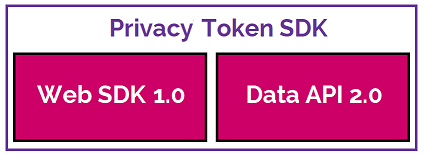Title
Create new category
Edit page index title
Edit category
Edit link
2. Privacy Token SDK
The ADARA Privacy Token SDK provides different options to onboard data on to the ADARA consortium to enable your use cases with ADARA. The initial release of the ADARA Privacy Token SDK consists of the Web SDK 1.0 and the Data API 2.0.
- Web SDK 1.0 - ADARA's preferred method for onboarding online identities and webpage event data; this is a client-to-server implementation
- Data API 2.0 - a secure REST API that can be implemented for offline and mobile applications or in conjunction with the Web SDK 1.0 integration; this is a server-to-server implementation
Both of these integrations within the ADARA Privacy Token SDK are privacy-safe, secure methods of sharing data while also allowing data rights management (DRM) through ADARA's DRM 2.0 service.

the ADARA Privacy Token SDK contains the Web SDK 2.0 and the Data API 2.0
Our Technical Services will partner with your team to recommend the best options and help with the onboarding.
Web SDK 1.0
The ADARA Web SDK loads on your web pages through a standard lightweight JavaScript code snippet. The code is available through our CDN but you can host the SDK locally if needed. See the Web SDK Quickstart section for more information
Like similar secure JavaScript SDKs from other platforms, tags can be implemented in any standard tag management system (TMS) such as Google Tag Manager or Tealium. Implementations are flexible for the desired use cases and can be as simple as setting up our base template or editing templates by adding your TMS data layer variables. See the Tag Management section for more information
ADARA recommends the Web SDK is the preferred method for onboarding online identities and webpage event data.
Examples of data to onboard with the Web SDK include:
- Login or registration
- Email signup
- Page views
- Search details
- Purchases
You may have implemented other such SDKs or even the legacy ADARA pixel. With the Web SDK, the critical change to address the emerging technology changes is that we have moved away from depending on a third-party cookie to leverage first-party data objects as part of the effort to future proof our solution.
Data API 2.0
ADARA's Data API is a secure REST API that can be implemented as an alternative to or in conjunction with the Web SDK integration. Like the Web SDK, the Data API is designed to be flexible to ease the burden of implementation on our partners and enable any type of data to be onboarded with less friction. See the Data API Quickstart section for more information
The Data API can be implemented when an SDK implementation is not applicable such as server-to-server integration with a mobile platform. It can also be used to enhance the Web SDK integration.
It is intended to support cases where:
- the data source is not web data
- a server-to-server integration is required or recommended
- transaction or purchase data may include refunds or sales outside the online channel
- adding master and dimension data to enhance the SDK integration
An example of enhancing SDK integration is providing detailed product information for purchases or hotel details for reservations.
© ADARA, Inc. All rights reserved.